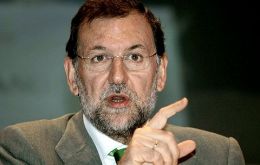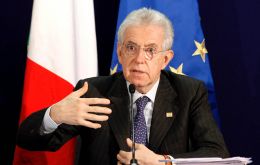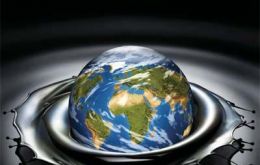MercoPress. South Atlantic News Agency
Stories for July 11th 2012
-
Wednesday, July 11th 2012 - 23:02 UTC
Uruguay concerned with Argentine economy growing misbalances

Uruguay’s Economy minister Fernando Lorenzo expressed concern about the deteriorating indicators from the Argentine economy which could have a negative impact on the country’s activity.
-
Wednesday, July 11th 2012 - 22:56 UTC
'Euroleaf', trademark for the strict EU organic farming standards

The “Euro-leaf” EU organic logo was introduced on 1 July 2010, but in order to help operators adapt to the new rules, and to avoid waste of existing packaging, a 2-year transition period was allowed before it was compulsory on all products.
-
Wednesday, July 11th 2012 - 22:33 UTC
ILO anticipates further job losses in Euro-zone because of austerity measures

The Euro-zone could lose 4.5 million more jobs in the next four years unless the region shifts away from austerity, the International Labour Organization (ILO) has warned. That rise would take unemployment in the 17-nation bloc to 22 million.
-
Wednesday, July 11th 2012 - 22:28 UTC
Rajoy raises VAT to 21% and drastically cuts benefits and other perks

Prime Minister Mariano Rajoy announced a swathe of new taxes and spending cuts designed to slash 65 billion Euros from the budget deficit by 2014 as recession-plagued Spain struggles to meet tough targets agreed with Europe.
-
Wednesday, July 11th 2012 - 22:23 UTC
Italy’s caretaker PM Monti says next year’s election can be looked at “with serenity”

Italy's technocrat Prime Minister Mario Monti, appointed last year to steer his country through a debt crisis, said he was confident a stable government would be formed after elections in 2013, playing down fears of deadlock after he steps down.
-
Wednesday, July 11th 2012 - 22:16 UTC
Germany expected to grow 1.9% in 2013 because of Euro crisis

Germany's DIW economic research institute slashed its 2013 forecast for Europe's largest economy by 0.5 percentage points to 1.9% on Wednesday, saying the Euro zone debt crisis would have a bigger impact than it had originally expected.
-
Wednesday, July 11th 2012 - 22:09 UTC
OECD/FAO anticipate promising future for farm-commodity prices

World farm commodity prices will edge higher in the next decade, and oilseeds are set to outperform wheat and other cereals, both trends fuelled by demand in emerging economies, the OECD said on Wednesday, presenting a joint report with the UN's food agency FAO.
-
Wednesday, July 11th 2012 - 20:19 UTC
Argentina to apply new software for quantifying international jigger fleet

Argentina’s National Institute for Fisheries Research and Development, Inidep, announced the development of software that can process, validate and/or automatically calibrate satellite night images of jiggers operating for squid at the 201 mile.
-
Wednesday, July 11th 2012 - 19:57 UTC
German proposal: richest citizens should pay more taxes or loan long term to governments

A leading German economic research institute has come up with one way to help countries involved in the euro crisis pay down their sovereign debt: get the wealthiest citizens to pay higher taxes, or force them to loan money to their governments.
-
Wednesday, July 11th 2012 - 19:35 UTC
OPEC lowers world oil demand forecast for next year

The Organization of the Petroleum Exporting Countries, left its forecast for 2012 growth in world oil demand unchanged at 0.9 million barrels a day, saying it expects growth to slow to 0.8 million barrels a day in 2013 due to a continuing global economic slowdown.
